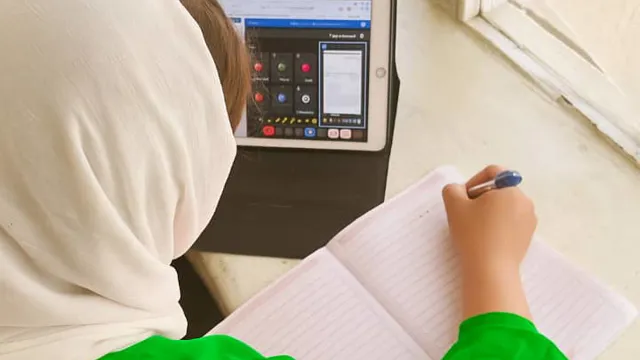When you hear the word "school", what comes to your mind? Maybe colored rooms, desks and chalkboards. Teacher's voices. Laughter of happy pupils during lunch breaks. The hum of moving forward. But for so many girls in Afghanistan today, “school” means something different. It means a dimly lit room, maybe a borrowed phone, a weak Wi-Fi signal or no signal at all.
It means whispers, fear, and hope wrapped tightly together. It means not giving up, even when everything tells you to. Online education is no longer just a tool for convenience; it is survival. It is resistance. For Afghan girls, it is the only open door when every other one has been slammed shut.
I think about that a lot. I think about how a laptop can become a lifeline. How a lesson through a screen can feel like a revolution. How a girl sitting in the corner of her room with a notebook in hand and looking at the screen is doing something revolutionary; she is DREAMING. She is dreaming of becoming a doctor, a writer, a leader, and a teacher. She aims to bring change not for herself, but for her family, her community, and for the upcoming generations.
But what she is doing it’s not easy. Online education in Afghanistan comes with its own set of struggles. The lack of stable internet. The shortage of devices. The constant fear of being caught or punished. Maybe worst of all, the emotional weight of feeling forgotten, unsupported, and invisible.
Afghan girls are phenomenal. I’ve read their stories. I’ve spoken to a few. And I’ve seen the strength in their words, even when their voices are shaking. They study in secret. They wake up at dawn to find a quiet place with stable internet. They learn English from YouTube. They download textbooks at midnight. They teach themselves coding, math, and science while their government had banned them from learning and growing while the world pretends, they can’t or shouldn’t.
They prove that education isn’t just school or libraries, it’s a heartbeat. It’s something you carry inside you, even when the doors are locked. And I think we, especially those of us in creative spaces, have a responsibility to amplify that heartbeat. To speak for those who can’t. To tell their stories. To say: “You matter. We see you. And we will not let your dreams be erased.” Because maybe one day, those screens will turn into windows, and those windows will open into classrooms, stages, offices, and libraries. The girls who once learned in secret will teach others in the open.
Until then, we keep writing. We keep raising our voices. And we keep reminding each other that education is not a privilege. It is a right. And no one, nowhere, should have to fight this hard just to learn.

